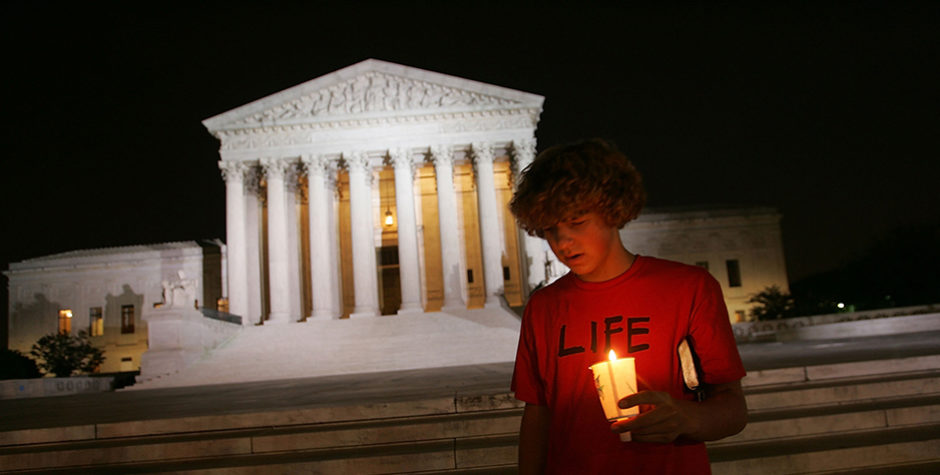ACLJ Urges Supreme Court To Follow Constitution, Not Pro-Abortion Court Rulings
The American Center for Law and Justice (ACLJ) Friday filed a friend-of-the-court brief urging the U.S. Supreme Court to put the Constitution itself ahead of its misguided pro-abortion precedents. As the ACLJ brief phrases it:
[I]f fidelity to the Constitution is to be a hallmark of this Court as an institution of laws, not of men, then the Justices must prefer a faithful reading of the Constitution to an acknowledged false reading, regardless of whether a past majority of this Court, in a previous ruling, has embraced the false interpretation.
The filing comes in a case out of Mississippi in which the state is defending its ban on abortions after 15 weeks of pregnancy. At 15 weeks, the baby has all limbs and is quite recognizable as a small baby. (Illustrations are available online.) Lower federal courts struck the law down, citing Supreme Court cases that declare that the right to abortion prevents states from protecting children in the womb before the child is “viable,” even where the child is as fully developed as in babies of 15 weeks gestation and beyond. (“Viability” under the Supreme Court’s definition is attained sometime around 22 weeks of gestation.) Mississippi has therefore filed a petition, in the case Dobbs v. Jackson Women’s Health Organization, seeking Supreme Court review.
The ACLJ filed an amicus brief supporting the state’s petition in Dobbs. The ACLJ brief focused upon the judge-made doctrine of “stare decisis,” a Latin phrase that means Courts should stand by past decisions absent a good reason to change course. This doctrine is used by abortion advocates to try to convince Supreme Court Justices to follow pro-abortion decisions even when the Justices know those decisions are incorrect. Misuse of this doctrine is thus a device for the abortion industry to retain lawless abortion precedents even when a majority of the Court otherwise consists of Justices who recognize that there is no “right to abortion” in the Constitution.
As we explain, stare decisis is generally a good rule:
The doctrine of stare decisis – namely, the judicial practice of presumptively (but not always) declining to revisit settled legal matters – is essential to judicial efficiency. A court (not to mention the litigants) simply would not have the time to revisit and reanalyze from scratch every single step of a legal adjudication in every single case. Instead, a court properly relies upon the body of previous court decisions absent some good reason to reopen the particular matter in question.
“However,” we emphasize, “the default assumption that prior decisions are correct cannot justify a knowing failure to follow the Constitution.”
To embrace an incorrect judicial interpretation of the Constitution (stare decisis is not needed to defend correct decisions), rather than ruling as required by the Constitution, is to exalt court rulings above the Constitution, in violation of both the . . . Supremacy Clause [of the Constitution, which states that] the Constitution is the “supreme Law of the Land” . . . , and the judicial oath of office (in which the judge or Justice pledges fidelity to the Constitution).
As Chief Justice John Marshall stated in the famous case of Marbury v. Madison, the Constitution is “a rule for the government of courts.” Thus, it makes no constitutional sense to let an erroneous Supreme Court decision trump the Constitution itself.
In the abortion context, that means the Supreme Court should not follow incorrect cases like Roe v. Wade and Planned Parenthood v. Casey, which almost all scholars and judges agree lack a basis in the Constitution. Instead, the Court should follow the law – the Constitution – and “disavow its egregious abrogation of virtually all state police power to protect children and their mothers from the atrocity of abortion.” As we put it:
[T]here is no proper place under our Constitution for a Court or Justice to say, “We are persuaded that Ruling A erroneously interpreted the Constitution, but we will nevertheless adhere to that ruling in preference to the Constitution itself.”
We hope and pray the Supreme Court soon has the courage to be faithful to the Constitution on this issue, rather than giving unconstitutional precedence to its own erroneous precedents, and takes up this important case.
The Supreme Court is likely to announce no sooner than late September whether it will hear the Dobbs abortion case.
